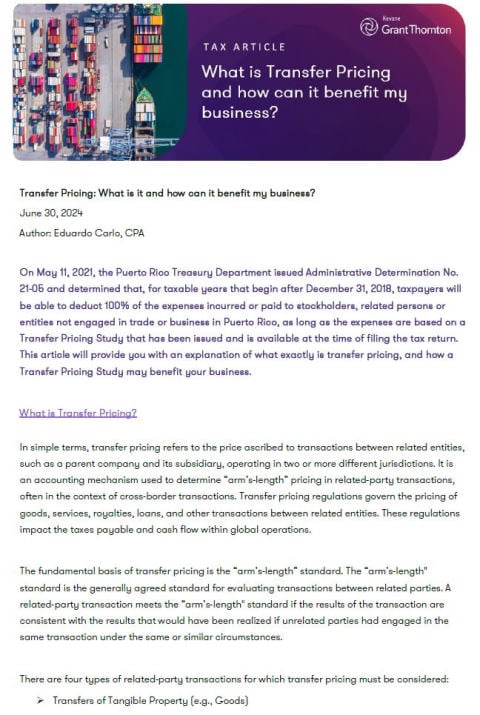-
Financial statements audits
Financial statement audits
-
Compliance audits
Compliance audits
-
Compilations and reviews
Compilations and audit
-
Agreed-upon procedures
Agreed-upon procedures
-
Corporate and business tax
Our trusted teams can prepare corporate tax files and ruling requests, support you with deferrals, accounting procedures and legitimate tax benefits.
-
International tax
Our teams have in-depth knowledge of the relationship between domestic and international tax laws.
-
Tax compliance
Business Tax
-
Global mobility services
Through our global organisation of member firms, we support both companies and individuals, providing insightful solutions to minimise the tax burden for both parties.
-
Sales and use tax and indirect taxes
SUT/ VAT & indirect taxes
-
Tax incentives program
Tax incentives program
-
Transfer Pricing Study
The laws surrounding transfer pricing are becoming ever more complex, as tax affairs of multinational companies are facing scrutiny from media, regulators and the public

-
Business consulting
Our business consulting services can help you improve your operational performance and productivity, adding value throughout your growth life cycle.
-
Business Risk Advisory
Risk is inevitable but manageable. We deliver relevant, timely and practical advices to aid organizations manage risk and improve business performance. We can help you identify, understand and manage potential risks to safeguard your business and comply with regulatory requirements.
-
Technology Advisory
We provide comprehensive solutions to safeguard your business and ensure operational resilience and compliance. Our expert team offers a range of technology advisory services designed to address your cybersecurity needs, enhance business continuity, and manage security effectively.
-
Transactional advisory services
Transactions are significant events in the life of a business – a successful deal that can have a lasting impact on the future shape of the organizations involved. Because the stakes are high for both buyers and sellers, experience, determination and pragmatism are required to bring deals safely through to conclusion.
-
Forensic and investigative services
At Grant Thornton, we have a wealth of knowledge in forensic services and can support you with issues such as dispute resolution, fraud and insurance claims.


Author:
Eduardo Carlo, Supervisor, Tax
On May 11, 2021, the Puerto Rico Treasury Department issued Administrative Determination No. 21-05 and determined that, for taxable years that begin after December 31, 2018, taxpayers will be able to deduct 100% of the expenses incurred or paid to stockholders, related persons or entities not engaged in trade or business in Puerto Rico, as long as the expenses are based on a Transfer Pricing Study that has been issued and is available at the time of filing the tax return. This article will provide you with an explanation of what exactly is transfer pricing, and how a Transfer Pricing Study may benefit your business.
What is Transfer Pricing?
In simple terms, transfer pricing refers to the price ascribed to transactions between related entities, such as a parent company and its subsidiary, operating in two or more different jurisdictions. It is an accounting mechanism used to determine “arm’s-length” pricing in related-party transactions, often in the context of cross-border transactions. Transfer pricing regulations govern the pricing of goods, services, royalties, loans, and other transactions between related entities. These regulations impact the taxes payable and cash flow within global operations.
The fundamental basis of transfer pricing is the “arm’s-length” standard. The “arm’s-length" standard is the generally agreed standard for evaluating transactions between related parties. A related-party transaction meets the “arm’s-length" standard if the results of the transaction are consistent with the results that would have been realized if unrelated parties had engaged in the same transaction under the same or similar circumstances.
There are four types of related-party transactions for which transfer pricing must be considered:
- Transfers of Tangible Property (e.g., Goods)
- Transfers of Intangible Property (e.g., Intellectual Property)
- Provision of Services
- Financing (e.g., Loans and Advances)
What is a Transfer Pricing Study?
A transfer pricing study is an analysis of the business from a global perspective, focusing on transactions among related entities and comparing the results of those transactions with the results of similar transactions among unrelated parties to determine if the charges are “arm’s-length”. The main purpose of a transfer pricing study is to analyze specific transactions that involve transfers of tangible property, transfers of intangible property, the provision of services, or intercompany financing, and compare such transactions with the industry’s standard to determine whether the transactions held between related parties are performed as if they were third parties.
In addition, a transfer pricing study also analyzes the taxpayer’s industry, its principal competitors, the company’s performance throughout the years, the assets used in the business, and the risks associated with its business operations. It is considered a comprehensive study that dives into the core business functions of a company and compares it to similar operations within the industry. It also offers valuable insight into the company’s performance and, ultimately, dictates whether the transactions between related parties are within an acceptable range.
Why is Transfer Pricing important?
The Internal Revenue Service and the Puerto Rico Treasury Department have the authority to adjust the income, deductions, credits, or allowances of taxpayers with related-party transactions to prevent evasion of taxes or to clearly reflect their income. Companies that fail to provide requested transfer pricing documentation (“Transfer Pricing Study”) within 30 days may face penalties. The Transfer Pricing Study must comply with U.S. Internal Revenue Code provisions and related regulations, which are also followed by Puerto Rican tax authorities.
In addition, the Puerto Rico Internal Revenue Code, as amended, (“PRIRC”) establishes that for income tax purposes, only 49% of the following expenses can be deducted:
- Expenses incurred or paid to a related person not engaged in trade or business in Puerto Rico, if such payments are attributable to the conduct of a trade or business in Puerto Rico and are not subject to withholding at source under the PRIRC during the taxable year in which it occurs; or
- Expenses incurred or paid to a home office located outside of Puerto Rico, by a foreign corporation engaged in trade or business in Puerto Rico through a branch operation.
Taxpayers subject to the limitation above, have the option to claim 100% of intercompany expenses if a Transfer Pricing Study is performed following the United States’ transfer pricing rules established in Section 482 of the U.S. Internal Revenue Code and its regulations. This Transfer Pricing Study must be available at the time of filing the income tax return.
How can a Transfer Pricing study Benefit my Business?
Every year more taxpayers establish and expand their operations in Puerto Rico to enjoy the benefits of Act 60 of July 1, 2019, as amended, known as the “Puerto Rico Incentives Code” or “Act 60”. While the 4% flat income tax rate and 100% tax exemption on dividends provided by Act 60 might seem appealing, relocating a business to a new jurisdiction comes with additional considerations beyond these initial factors. One of the most common difficulties arises because many companies considering the benefits of Act 60 are already set up and fully functional in their home jurisdiction, and the relocation does not occur all at once, leaving some functions in the original entity. This eventually translates into intercompany charges between both entities.
This is where the planning phase becomes crucial. If these expenses or allocations are totally or partially disallowed by any of the jurisdictions involved, this can destroy your strategy and your expected tax savings, leaving you to question the cost-effectiveness of the relocation in the first place. One way to help mitigate such risks is through a Transfer Pricing Study.
A Transfer Pricing Study is a multi-functional tool. It can provide guidance as to how the market is doing, it can help establish markup rates for services or goods provided and serve as evidence of “arm’s-length” pricing in the event of an audit or investigation procedure by a governing jurisdiction. In addition to being able to deduct 100% of intercompany expenses and avoiding underpayment penalties, companies with a solid transfer pricing structure can maximize tax savings while complying with the documentation requirements of local and federal tax authorities.
Key Takeaways:
- Transfer pricing is a mechanism for determining “arm’s-length” pricing in related-party transactions, often in the context of cross-border related-party transactions.
- Related-party transactions include transfers of tangible and/or intangible property, the provision of services, and intercompany financing.
- A related-party transaction meets the “arms-length” standard if the results of the transaction are consistent with the results that would have been realized if unrelated parties had engaged in the same transaction under the same or similar circumstances.
- A transfer pricing study is a comprehensive analysis that dives into the core business functions of a company and compares it to similar operations within the industry.
- Taxpayers may deduct 100% of intercompany expenses on their Puerto Rico income tax return if a Transfer Pricing Study is performed and available at the time of filing the return.
- The Internal Revenue Service and Puerto Rico Treasury Department have the authority to adjust the income, deductions, credits, or allowances of taxpayers with related-party transactions.
- Companies that fail to present, when requested, proper transfer pricing documentation may be subject to underpayment penalties.
- A solid transfer pricing structure maximizes tax savings and reduces tax burdens.

